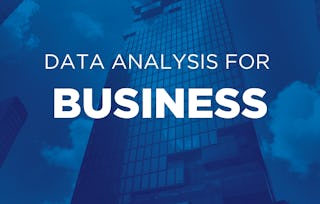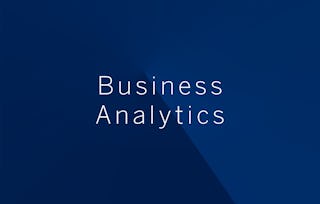In this course, you will learn best practices for how to use data analytics to make any company more competitive and more profitable. You will be able to recognize the most critical business metrics and distinguish them from mere data.

Business Metrics for Data-Driven Companies
Seize the savings! Get 40% off 3 months of Coursera Plus and full access to thousands of courses.

Business Metrics for Data-Driven Companies
This course is part of Excel to MySQL: Analytic Techniques for Business Specialization


Instructors: Daniel Egger
302,664 already enrolled
Included with
8,467 reviews
Skills you'll gain
Details to know

Add to your LinkedIn profile
See how employees at top companies are mastering in-demand skills

Build your subject-matter expertise
- Learn new concepts from industry experts
- Gain a foundational understanding of a subject or tool
- Develop job-relevant skills with hands-on projects
- Earn a shareable career certificate

There are 5 modules in this course
Earn a career certificate
Add this credential to your LinkedIn profile, resume, or CV. Share it on social media and in your performance review.
Instructors


Offered by
Explore more from Data Analysis
 Status: Free Trial
Status: Free TrialFundação Instituto de Administração
 Status: Preview
Status: PreviewCampus BBVA
 Status: Free Trial
Status: Free Trial Status: Preview
Status: Preview
Why people choose Coursera for their career

Felipe M.

Jennifer J.

Larry W.

Chaitanya A.
Learner reviews
- 5 stars
68.42%
- 4 stars
25.10%
- 3 stars
4.78%
- 2 stars
0.80%
- 1 star
0.88%
Showing 3 of 8467
Reviewed on Apr 25, 2020
Great introduction and foundation on how to think about and conceptualize business metrics. I really needed this and it helps when thinking about what metrics would be useful for where I work.
Reviewed on Feb 26, 2017
It's the first course from the specification, which makes us better understand the necessary business metrics for data-driven companies, and it is a good entry for following modules. Help me a lot.
Reviewed on Oct 1, 2020
Very interesting course! I learnt a lot about business metrics. Things I didn't known. Now I am able to understand better the business strategies. Practical. Easy to follow and very well explained!

Open new doors with Coursera Plus
Unlimited access to 10,000+ world-class courses, hands-on projects, and job-ready certificate programs - all included in your subscription
Advance your career with an online degree
Earn a degree from world-class universities - 100% online
Join over 3,400 global companies that choose Coursera for Business
Upskill your employees to excel in the digital economy
¹ Some assignments in this course are AI-graded. For these assignments, your data will be used in accordance with Coursera's Privacy Notice.

